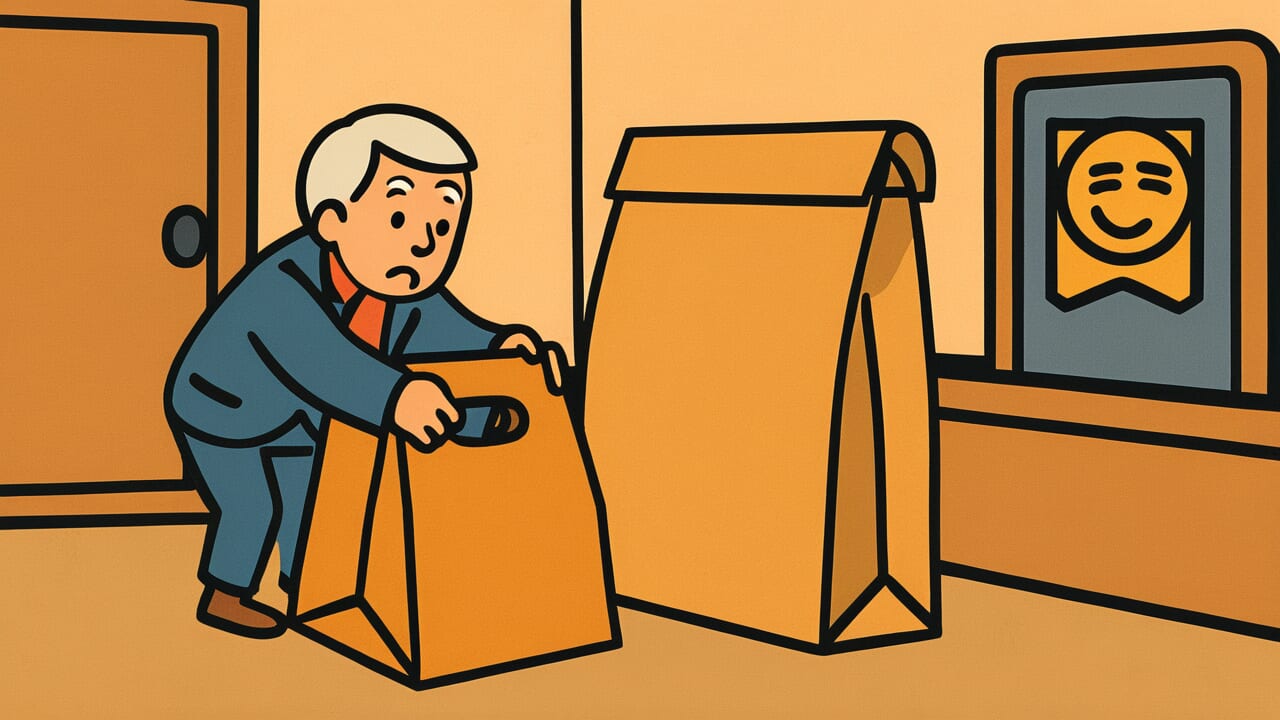How to Read “The elderly and paper bags won’t stand unless you put something in them”
Toshiyori to kamibukuro wa irene ba tatanu
Meaning of “The elderly and paper bags won’t stand unless you put something in them”
This proverb means that elderly people, like paper bags, cannot stand on their own without substance inside. The “substance” refers to wisdom gained from experience, skills developed over time, personal character, or a sense of purpose and role in life.
Simply growing old is not enough. Without substance, a person is like an empty paper bag—limp and unable to stand firm.
What matters is what you learned, what you acquired, and who you became during your long life. This “substance” is what makes a person respected and dependable.
This proverb is sometimes used to criticize older people. But it also serves as a warning to those who are aging.
It teaches the importance of continuous learning, accumulating experience, and deepening your character as a human being. Growing old is not enough—you must grow wise.
Origin and Etymology
There is no clear record of when this proverb first appeared in written form. However, the structure of the phrase suggests it came from observations rooted in everyday Japanese life.
The use of the word “paper bag” suggests this expression emerged after paper became common in ordinary people’s lives. This was likely during the mid-Edo period or later.
Paper bags at that time were not sturdy like modern ones. They were simple items made by folding thin washi paper. An empty paper bag would collapse flat and could not stand on its own.
The cleverness of this proverb lies in comparing this property of paper bags to the condition of elderly people.
The word “elderly” doesn’t just mean someone who has aged. It implies someone who should possess “substance”—experience, knowledge, and a meaningful role.
By placing two seemingly unrelated things side by side—paper bags and elderly people—the proverb sharply captures a truth about human nature.
It shows the keen observation of our ancestors, who found life’s truths in everyday objects like paper bags.
Usage Examples
- That person is old, but “the elderly and paper bags won’t stand unless you put something in them”—they never gained any real experience, so you can’t rely on them
- Since “the elderly and paper bags won’t stand unless you put something in them,” I must keep learning every day, not just grow older
Universal Wisdom
This proverb has been passed down through generations because it captures an essential truth about the relationship between age and value in human society.
In many societies, elders are automatically considered worthy of respect. But people don’t naturally become respectable just by growing old. This proverb faces that harsh reality directly.
The brilliance of this proverb lies in using an everyday object—the paper bag—as an example.
Through the familiar properties of a paper bag, it speaks about human nature. Just as an empty paper bag collapses, a person without substance cannot stand independently.
This simple and clear metaphor resonates with people across time.
Everyone ages. But there’s a huge difference between a life where you simply wait for time to pass and a life where you treasure each day and accumulate meaningful experiences.
The destinations are completely different.
This proverb teaches a universal truth: what determines true value is not the external number of your age, but the richness of your inner life.
Our ancestors understood the difference between living long and living richly. That insight is condensed into these few words.
When AI Hears This
Observing a paper bag reveals something interesting. An empty paper bag bends under its own weight and eventually collapses completely. This is what structural mechanics calls “buckling.” Slender structures can collapse from their own weight alone, without external force.
But when you put something inside, a force pushing outward from within emerges. This allows the paper bag to keep standing.
The thermodynamic perspective becomes important here. Left alone, all structures collapse, energy disperses, and things move toward disorder.
This is the law of entropy increase. Paper bags collapsing, buildings decaying, and organisms aging all follow the same principle.
To maintain an orderly state, you must continuously inject energy or matter from outside.
The human body has the same structure. The internal support structure called muscle cannot be maintained without continuous injection of matter and energy through food.
As people age, muscle mass decreases, making it harder to maintain posture against gravity.
“Putting something in” means more than just physical support. It means nutrition, conversation, and role—continuous energy injection from society.
This proverb intuitively grasped, through everyday observation, a physical law: paper bags, humans, and all order in the universe will inevitably collapse if isolated.
Lessons for Today
What this proverb teaches us today is that life is measured not by its length, but by its density.
In modern society, age-based hierarchy has weakened, and merit-based systems are emphasized. But this actually aligns with the essence of this proverb.
What matters is not how many years you’ve lived, but what you learned and who you became during those years.
Whatever your age right now, this proverb delivers an important message.
For young people, it teaches that each experience you accumulate becomes the “substance” that will support your future self.
For older people, it reminds them that learning never ends. You must always make efforts to enrich yourself.
Small daily learnings, new challenges, encounters with people, lessons from failures—all of these fill your “bag” and become the “substance” that makes you stand firm.
Don’t use age as an excuse. Take a step today to enrich yourself. That is the path to a fulfilling life.



Comments